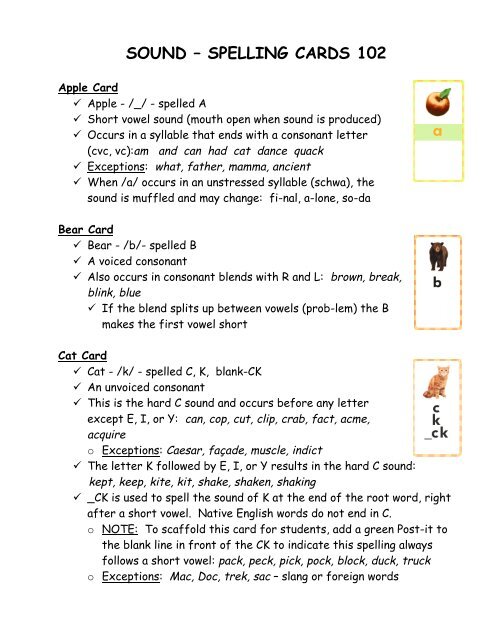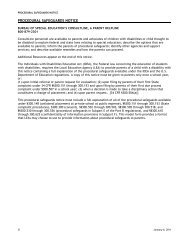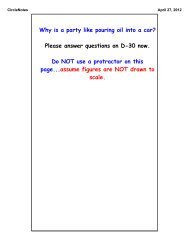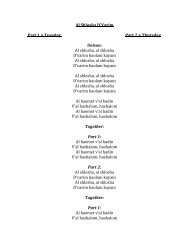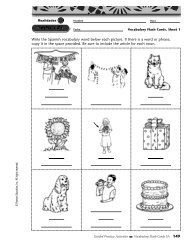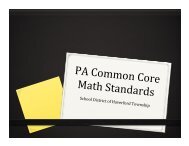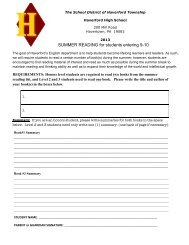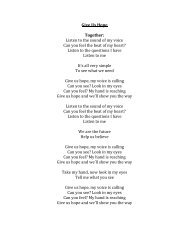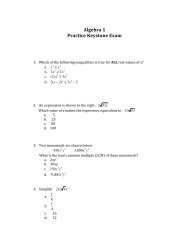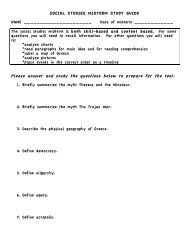SOUND â SPELLING CARDS 102
SOUND â SPELLING CARDS 102
SOUND â SPELLING CARDS 102
Create successful ePaper yourself
Turn your PDF publications into a flip-book with our unique Google optimized e-Paper software.
<strong>SOUND</strong> – <strong>SPELLING</strong> <strong>CARDS</strong> <strong>102</strong><br />
Apple Card<br />
Apple - /_/ - spelled A<br />
Short vowel sound (mouth open when sound is produced)<br />
Occurs in a syllable that ends with a consonant letter<br />
(cvc, vc):am and can had cat dance quack<br />
Exceptions: what, father, mamma, ancient<br />
When /a/ occurs in an unstressed syllable (schwa), the<br />
sound is muffled and may change: fi-nal, a-lone, so-da<br />
Bear Card<br />
Bear - /b/- spelled B<br />
A voiced consonant<br />
Also occurs in consonant blends with R and L: brown, break,<br />
blink, blue<br />
If the blend splits up between vowels (prob-lem) the B<br />
makes the first vowel short<br />
Cat Card<br />
Cat - /k/ - spelled C, K, blank-CK<br />
An unvoiced consonant<br />
This is the hard C sound and occurs before any letter<br />
except E, I, or Y: can, cop, cut, clip, crab, fact, acme,<br />
acquire<br />
o Exceptions: Caesar, façade, muscle, indict<br />
The letter K followed by E, I, or Y results in the hard C sound:<br />
kept, keep, kite, kit, shake, shaken, shaking<br />
_CK is used to spell the sound of K at the end of the root word, right<br />
after a short vowel. Native English words do not end in C.<br />
o NOTE: To scaffold this card for students, add a green Post-it to<br />
the blank line in front of the CK to indicate this spelling always<br />
follows a short vowel: pack, peck, pick, pock, block, duck, truck<br />
o Exceptions: Mac, Doc, trek, sac – slang or foreign words
When the occasion arises, a Post-it with the CH spelling for the<br />
sound of K may be added to the cat card. Words of Greek origin,<br />
borrowed by the Romans, contained a sound they could not<br />
pronounce. They rewrote the sound using the CH: school,<br />
Christmas, chlorine, character, stomach<br />
Duck Card<br />
Duck - /d/ - spelled D, blank-ED<br />
A voiced consonant<br />
Can occur in consonant blends with R and W – DR and DW:<br />
drink, draw, dwarf, children, laundry<br />
The _ED is pronounced as a voiced /d/ sound if it follows<br />
a vowel or a voiced or nasal consonant: closed, dined, timed, pulled<br />
The _ED is pronounced as /t/ following an unvoiced<br />
consonant other than the letter T: asked, mixed, baked<br />
The _ED is pronounced as a separate syllable –ed after D<br />
and T: added, handed, voted, pasted, completed<br />
Elephant Card<br />
Elephant - /_/ - spelled E<br />
Short vowel sound when it is within the syllable – cvc<br />
Short vowel sound when it begins a word and is followed by<br />
a consonant in the same syllable – egg, ef-fort, ex-tra<br />
o Exception: pretty<br />
E is also short when combined with A to form the vowel<br />
team EA -- head, deaf, bear, heavy, breath, bread<br />
The sounds of E are muffled beyond recognition in the syllables<br />
which are the most hurried and the least stressed. This happens<br />
mainly to the sounds spelled by the simple letter E:<br />
telephone, competition, funnel, basket, confidence
Fish Card<br />
Fish - /f/ - spelled F<br />
An unvoiced consonant<br />
May be part of a consonant blend with L and R – FL an FR:<br />
free, from, flat, friend, flower, Friday<br />
These blends seldom split up between vowels; the vowel<br />
before the blend is long - refrain, reflect<br />
When the occasion arises, a Post-it with the _FF spelling may be<br />
added to the fish card. The _FF is a letter team for the sound of F<br />
following a short vowel at the end of a syllable or word. Adding a<br />
green Post-it to the blank line in front of the FF will scaffold this<br />
spelling pattern for your students: off, staff, bluff, gruff, sheriff,<br />
fluff<br />
When the occasion arises, a Post-it with the PH spelling may be<br />
added to the fish card. This is a Greek spelling for the F sound:<br />
phone, photo, elephant, alphabet, graph<br />
When P and H belong to different syllables, they do not make the F<br />
sound (loophole, shepherd, uphill).<br />
In a very few instances, the F sound is made by the consonant team<br />
of GH (rough, tough, cough, laugh), but since there are so few of<br />
these words, it is not recommended that a post-it be added to the<br />
Fish card.<br />
Goose Card<br />
Goose - /g/ - spelled G<br />
A voiced consonant<br />
G makes the hard G sound when it comes before any letter<br />
except E, I, or Y – game, go, glass, dogfish, fragment, signal<br />
G makes the hard sound when it has nothing that comes<br />
after it: beg, bag, dog, leg, brag<br />
o Exceptions: get, give, girl, begin, gaunt,<br />
G may also be joined with R and L in consonant blends. If the blend<br />
is split over syllables, the vowel before it is short. If the blend does<br />
not split, the vowel before it is long: prog-ress, pro-gram
In a very few instances, G combines with H to form the hard G sound<br />
(ghost, ghoul, spaghetti) but since there are so few of these words,<br />
it is not recommended that a post-it be added to the Goose card.<br />
GU can also be a consonant team for the hard G sound. This occurs<br />
when the next letter is an E or an I: guess, league, guide. The GU<br />
keeps the E or I from making the G a soft G.<br />
GU may also be a consonant blend where the G is hard and the U<br />
represents the sound of W: penguin, language, distinguish<br />
Horse Card<br />
Horse - /h/ - spelled H - blank<br />
An unvoiced consonant<br />
In English, the H has one basic sound, the first sound in<br />
help. It makes this sound when it is the first letter in a<br />
word or syllable.<br />
There are some French and Latin words in which the H is<br />
silent: honor, heir, hour, honest, exhaust, vehicle<br />
H almost never occurs alone after a vowel in English; exceptions<br />
being oh, ah, hah, eh, uh (approximations of inarticulate grunts)<br />
H is the second letter in the consonant teams CH, GH, PH, RH, SH,<br />
TH, WH; teams for sounds which did not exist in the Latin language<br />
(refer to CH, SH, TH, WH cards)<br />
Igloo Card<br />
Igloo - /_/ - spelled I<br />
I is short in a syllable that ends with a consonant – cvc or<br />
vc: it, is, bit, mist, print, quilt, bit-ten, pre-dic-tion<br />
When there are two consonants between vowels, the first<br />
vowel is almost always short: fifty, assistant, timber,<br />
missed<br />
Only words of foreign origin, slang terms, and the pronoun I end in<br />
the letter I: hi-fi, taxi, macaroni, alibi, fungi, timpani<br />
Unlike the sounds of other English vowels, the sounds of I in<br />
unstressed syllables (schwa) are fairly distinct. When the next<br />
letter is a consonant, the I remains detectably long or short,
depending on how it would sound if stressed: i-de-a-lism, li-bra-ri-an,<br />
ta-king. When I, before a vowel, is unstressed because it is in a<br />
suffix, it has a distinct long E sound: hap-pi-er, va-ri-ous<br />
NOTE: The kindergarten Alphafriend card is an Iguana card, not an<br />
Igloo card<br />
Jumping Jill Card<br />
Jumping Jill - /j/ - spelled J, GE, GI-blank, blank-DGE<br />
J is a voiced consonant: job, joke, jolly, jacket, enjoy,<br />
subject, adjourn<br />
J is never used as the last letter in a word, instead –GE or<br />
–DGE is used<br />
GE is used at the end of a word that ends with the J sound:<br />
page, huge, large, forge, plunge, bulge. The silent E makes<br />
the G soft and the vowel long, unless the GE is preceded by<br />
another consonant.<br />
In words of French origin, the GE at the end of a word is pronounced<br />
ZH: garage, mirage, lingerie<br />
GI_ is used at the beginning of a syllable when a J sound is needed:<br />
giant, ginger, magic, longitude<br />
o Exceptions: In some words, G is followed by an E, I, or Y and<br />
makes the hard G sound: get, girl, give, gift<br />
-DGE is a consonant team for the sound of J at the ends of root<br />
words following a short vowel: judge, edge, bridge, hedgehog,<br />
midget. The silent E is needed to make the G a soft G, and the D is<br />
needed so that the silent E does not make the first vowel long.<br />
o NOTE: It is suggested that a green Post-it be added to the<br />
blank line in front of the DGE on the Jumping Jill Card.
Kangaroo Card<br />
Kangaroo - /k/ - spelled K, C, blank-CK<br />
K is an unvoiced consonant<br />
In English K is used only before E, I, or Y when a hard C<br />
sound is needed: king, keep, kitten, shaky, musk, break<br />
sound are spelled _ck, but on the K is used if the /k/<br />
sound follows two vowels (peak, steak) or immediately<br />
follows a consonant (milk, chalk, mink)<br />
Root words ending in the K sound must be spelled with K<br />
(or CK) because most of them take suffixes that begin with E, I, or<br />
Y: ask/asking, luck/lucky, speak/speaking<br />
o Exceptions: disc, arc, franc, zinc, talc – words of foreign<br />
origin<br />
In some words of French origin, QUE makes a /k/ sound: bouquet,<br />
mosquito, torque, critique. There are so few of these words in<br />
elementary texts, adding QUE to the Kangaroo card is not<br />
recommended.<br />
Lion Card<br />
Lion - /l/ - spelled L, blank-LE<br />
L is a voiced consonant<br />
The sound of L is a very sophisticated sound and is<br />
especially difficult for beginning reading students,<br />
particularly when it occurs before a vowel<br />
The letter L is often the first letter in a syllable: let,<br />
last, tab-let, quick-ly<br />
The letter L is the last member in some consonant blends: black,<br />
clean, chlorine, flag, glad, plan, slip, splash<br />
When the L sound occurs at the end of a root word we use LL to spell<br />
it: ill, hill, still, cell, fell, mull.<br />
Unlike _ff and _zz the LL spelling does not always follow a short<br />
vowel. In words of Native English origin, the A may be changed to<br />
the AW sound (hall, ball, tall) and the O sound may be changed to a<br />
long O sound (roll, poll,
-LE is an English suffix that is pronounced the same way as /el/; _LE<br />
captures the consonant immediately preceding it to create a<br />
separate syllable: ta-ble, ap-ple, bub-ble<br />
When L occurs after a long vowel sound in a single syllable word, the<br />
word often sounds like it has two syllables: pail, feel, tile, coal, rule,<br />
boil, howl, cool<br />
The letter L can also be silent before K, M, F, or D; however,<br />
because there are so few of these words, it is not recommended<br />
that LK, LM, LF, or LD be added to their respective Sound-Spelling<br />
cards<br />
Mouse Card<br />
Mouse - /m/ - spelled M<br />
M is a nasal consonant: when the mouth is held closed the<br />
voice carries the sound through the nose<br />
M is a consonant letter used anywhere in a word: me, map,<br />
am, came, important, prism, admit<br />
MB and MN are consonant teams for the sound of M:<br />
climb, comb, thumb, hymn, column. However, there are so<br />
few words with these spelling patterns it is not recommended that<br />
Post-its with MB or MN be added to the Mouse card.<br />
Noodle Card<br />
Noodle - /n/ - spelled N, KN-blank, GN<br />
N is a nasal consonant used anywhere in a word: no, snow,<br />
any, noun, tradition, glen, planned<br />
KN is a consonant letter team for the sound of N used only<br />
at the beginning of a root word: know, knit, knight, knee,<br />
knothole, ac-know-ledge, un-known<br />
GN is a consonant team for the sound of N: gnaw, gnat,<br />
align, gnu, assign, design<br />
GN occasionally represents the sound /ny/: poignant<br />
GN followed by a Latin suffix breaks up and becomes a hard G:<br />
signal, malignant
Ostrich Card<br />
Ostrich - /_/ - spelled O<br />
O is a short vowel when it occurs within a syllable (cvc):<br />
hot, fond, concert, hot-ter, a-dop-ted<br />
o Exceptions: The O sound within a syllable will<br />
sometimes make the short U sound or the long O<br />
sound. Students should be taught to try a short U sound or a<br />
long O sound when the short O sound does not work: son, ton,<br />
front, mother, company, oven, color, come, some, none, done,<br />
love, most, both, don’t<br />
O is short at the beginning of a word when it is followed by a<br />
consonant: on, off, obstacle, optional<br />
In words where the O is followed by L or LL in a stressed syllable,<br />
the L goes off with the next syllable and the O is short (jo-lly,<br />
ho-llow, o-live, so-lid, bi-o-logy), except when the L is single and the<br />
suffix makes it a long O (cor-o-llary, co-llapse, po-lar )<br />
In hurried, unstressed syllables, the O sound is muffled (schwa).<br />
This happens mainly to the sounds spelled by the simple letter O:<br />
po-ta-to, oc-cur, com-bine<br />
NOTE: The kindergarten Alphafriend card is an Octopus card, not<br />
an Ostrich card<br />
Pig Card<br />
Pig - /p/ - spelled P<br />
P is an unvoiced consonant that has one basic sound /p/:<br />
pan, plan, up, tape, happy, crisp, price, spice<br />
P may occur in consonant blends: SP, PL, SPR, SPL, PR:<br />
spin, play, spring, splash, prod. In all these blends, the P<br />
retains its /p/ sound<br />
The letter P may occur in the consonant blends PS and PN:<br />
psychology, psychic, pneumatic, pneumonia. In these blends, the P is<br />
silent.
Queen Card<br />
Queen - /kw/ - spelled QU-blank<br />
QU is the way we spell the Old English consonant blend<br />
CW: quick, quiet, quilt, squirrel, quarter<br />
The QU blend is always followed by a vowel. Since vowels<br />
are red on the Sound-Spelling cards, you could scaffold<br />
the blank line on the Queen card by placing a post-it with<br />
a red blank line over the black blank line<br />
The QU blend sometimes splits up across a syllable: liq-uid, eq-ual,<br />
tranq-uil<br />
In some words of French origin, QU adds a silent E and becomes a<br />
/k/ sound: bouquet, mosquito, torque, critique. There are so few of<br />
these words in elementary texts, adding QUE to the Kangaroo card<br />
is not recommended.<br />
Rooster Card<br />
Rooster - /r/ - spelled R, WR-blank<br />
The letter R is a voiced consonant for the first sound in<br />
rabbit: rain, tree, run, carry, rich<br />
It is not the /er/ sound. The lips should form a pursed<br />
(kissing) circle and a stream of air is emitted from the<br />
lips.. When making the /er/sound (Bird card), the lips are<br />
open in a square and no stream of air is emitted.<br />
The letter R is a sophisticated sound and is especially difficult for<br />
beginning reading students. Making and hearing the R sound after<br />
consonants and in consonant blends (br, fr, gr, shr, tr, spr, cr, scr)<br />
develops later than other combinations.<br />
All short vowel sounds are distorted when followed by the R sound:<br />
car, for, her, sir, fur<br />
o The R sound changes short A to the short O sound: car, far<br />
o The R sound changes short O to the long O sound: for, more<br />
o The R sound changes short E, I, U and the short vowel team EA<br />
to the ER sound: her, fir, fur, learn, early
When the R sound follows a long vowel and some vowel pairs in a<br />
single syllable word, the word may sound like it has two syllables:<br />
fair, fear, tire, core, sour, poor, pure<br />
WR_ is a native English spelling for the sound of R at the beginning<br />
of a word only. At one time the W was pronounced. Most of these<br />
words have meanings connected to the idea of twisting: write, wrist,<br />
wrench, wrap, wrestle, wrinkle<br />
In words borrowed by the Romans from the Greeks, the initial sound<br />
of R is spelled RH: rhyme, rhythm, rhombus, rheumatism. There are<br />
too few of these words in the English language to add a Post-it to<br />
the Rooster card.<br />
Seal Card<br />
Seal - /s/ - spelled S, CE, CI-blank<br />
The letter S is an unvoiced consonant for the first<br />
sound in seal and sail: sat, same, sight, soap, soot<br />
o Note: See the Zebra card for the voiced S sound<br />
The letter S is unvoiced when it is the first member of a<br />
consonant blend: scar, school, skim, slip, smoke, snake,<br />
spin, split, spring, squeak, stick, street, swing, desk, crisp, must,<br />
sphere, schizophrenic, sword<br />
The letter S is unvoiced when spelled S or SS and is between vowels:<br />
case, basin, besides, usage, house, missile, tassel<br />
The letter S is the most actively used native English suffix, forming<br />
plural nouns (cat/cats, lip/lips) and the third person singular of the<br />
present tense of verbs (run/runs, hit/hits)<br />
The letter S makes the unvoiced /s/ sound after unvoiced<br />
consonants: cuffs, looks, tops, hits, rakes, types, notes<br />
When the unvoiced S sound occurs at the end of a root word,<br />
following a short vowel, it is spelled SS. Because there are a<br />
significant number of words ending in SS, when the occasion arises,<br />
it is recommended that you add a post-it to the Seal card that has a<br />
blank with a green post-it in front of the SS spelling: mass, boss,<br />
kiss, kindness, princess
A single S occurs at the ends of Latin suffixes: -ous, -as, -is, -os, -<br />
us: famous, canvas, basis, cosmos, cactus, focus<br />
Some root words end in an unvoiced SE: horse, else, nurse, goose,<br />
grease, tortoise. The silent E shows the reader that the S is not a<br />
suffix and helps distinguish between lapse/laps, diverse/divers.<br />
o Some words ending in SE have a voiced /z/ sound. See the<br />
Zebra card.<br />
In the consonant blend SC preceding E, I, or Y, the C has a soft<br />
sound, so the blend sounds like a plain S sound: scene, science, scent<br />
The letter C makes the soft /s/ sound when it is followed by the<br />
letters E, I, or Y: cent, cedar, city, cider, cycle, race, racy<br />
While the CE spelling for the /s/ sound can come at the end of a<br />
word (dance, mice, face, once, police), words of English origin do not<br />
end with CI. The CI spelling for the /s/ sound is always followed by<br />
another letter: pencil, deficit, appreciate, scissors<br />
A few rare words end with or contain the unvoiced S sound, but it is<br />
written as a Z: chintz, quartz, eczema, howitzer<br />
Tiger Card<br />
Tiger - /t/ - spelled T, blank-ED<br />
The letter T is an unvoiced consonant<br />
The letter T has one basic sound, the first sound in top:<br />
time, train, last, cotton, title, little, stain, fist<br />
_ED is an inflected ending that changes a verb to the past<br />
tense; it is pronounced as a /t/ sound if it follows an<br />
unvoiced consonant: asked, backed, taped, shaped, mixed, guessed,<br />
wished<br />
The letter T is silent in –STLE, -STEN, AND –FTEN: castle, wrestle,<br />
listen, fasten, often, soften<br />
The letter T is part of the consonant blends TR, TW, and STR: tree,<br />
treat, twice, twinkle, symmetry, strawberry, strike<br />
In words of French origin, a final T is silent: bouquet, depot, debut;<br />
but when a final silent E is added the T is pronounced: route, suite,<br />
petite, elite, gazette, etiquette
Umbrella Card<br />
Umbrella - /_/ - spelled U<br />
The letter U is short when it is within a syllable (cvc, vc):<br />
but, fun, drum, dump, sub-ject, bundle<br />
o Exception: When the consonant following the short<br />
U is an R, the short U sound changes to the ER<br />
sound: fur, turn, burst, turkey, purple, hurry<br />
In words that begin with U, the U is short if it has a<br />
consonant after it in the same syllable: up, un-der, un-like, un-done<br />
Volcano Card<br />
Volcano - /v/ - spelled V<br />
The letter V is a voiced consonant: five, vine, vote, never,<br />
oven, advocate, behavior, adventure, gave<br />
Unlike other consonants, the letter V is never doubled<br />
when adding a native English suffix: driving, arriving,<br />
evolving, diver<br />
The letter V never appears at the end of a word without a<br />
silent E: give, live, have, prove, cleave, improve.<br />
o In these words the silent E does not make a single vowel<br />
before it long, rather these words have either a short I or U<br />
sound (glove, love, give, native) or a long OO sound (move,<br />
prove). Vowel teams retain their sounds, however: groove,<br />
waive, heave, receive, sleeve, mauve<br />
Worm Card<br />
Worm - /w/ - spelled W-blank<br />
The letter W is a voiced consonant that occurs before<br />
the vowel by itself or as the second member of a<br />
consonant blend: we, went, twelve, twist, swing, dwell<br />
When the /w/ sound is pronounced a stream of air is<br />
emitted from the lips.
When W comes before A or O within the syllable the vowel remains<br />
short if followed by G, CK, K, X or NG:<br />
wag, wax, twang, polliwog, quack<br />
o Otherwise, when W comes before A or O withing the syllable,<br />
the short A changes to the short O sound: want, wash, swap<br />
o Or the short O changes to a short U sound: won, wonder,<br />
woman<br />
o If the letter after the changed A or O is R, or R followed by a<br />
different consonant, it changes the short O sound of the A to a<br />
long O sound and it changes the short U sound of the O to the<br />
same sound as in UR: war, warm, warden, world, worse<br />
Fox Card<br />
Fox - /ks/ - spelled blank-X<br />
X is a single letter for the consonant blend KS: ox, six,<br />
relax, next, except, oxygen<br />
The letter X follows a single vowel, the vowel is short.<br />
Scaffolding the Fox card with a green Post-it is<br />
recommended.<br />
o Exceptions: when X follows a vowel team, the team<br />
retains its normal sound: hoax<br />
When a word ends in the KS blend sound, the letter X keeps the<br />
word from looking like the suffix –s has been added to it: tax/tacks,<br />
lax/lacks<br />
The letter X is never doubled when adding a suffix since it already<br />
represents two consonant sounds<br />
In a few unusual words, the letter X sounds like Z: Xerox,<br />
xylophone, xerxes, xenophobia. Do not add this sound to the Zebra<br />
card.<br />
NOTE: The kindergarten Alphafriend is the Mr. X-ray card and not<br />
the Fox card.
Yo-Yo Card<br />
Yo-yo -- /y/ -- spelled Y-blank<br />
This card represents Y in its voiced consonant form at<br />
the beginning of a word or syllable: you, yes, yard, yellow,<br />
lawyer, canyon<br />
Anywhere else in a word, the letter Y is a vowel<br />
o Y is short within a syllable: gym, symbol<br />
o If the suffix begins with I, the Y remains unchanged since<br />
we never have two I’s in a row in English: crying, flying<br />
o Y is long and sounds like long I when:<br />
it is the only vowel in the root of the word, and is the<br />
very last letter of the word: by, cry, fly, deny, satisfy<br />
Y is stressed because of being in a root: cries, denied,<br />
trial<br />
it is the last letter in a syllable: ty-rant (unless the<br />
word is of Latin origin – cynic)<br />
it is in the spelling pattern Y_E (type, style) or the vowel<br />
team YE (rye, bye)<br />
it is stressed before another vowel:<br />
cy-a-nide, hy-a-cinth<br />
o Y is long and sounds like long E when:<br />
it is unstressed because of being in a suffix: candy,<br />
sandy, happily<br />
it is unstressed before another vowel: hal-cy-on
Zebra Card<br />
Zebra - /z/ - spelled Z, blank-S<br />
The letter Z is a voiced consonant. It is the same sound as<br />
the voiced S, but S is never voiced at the beginning of a<br />
word: zero, zone, zipper, fuzzy, frozen, realize<br />
The double ZZ always follows a short vowel. There are not<br />
that many words with ZZ but this could be added to the<br />
Zebra card if deemed necessary. Add a green Post-it on<br />
the blank line in front of the ZZ if you do put it on your Sound-<br />
Spelling card: buzz, fizz, puzzle, drizzle, fuzzy<br />
o Exceptions: quiz, whiz, fez<br />
A voiced S makes the Z sound:<br />
o S between vowels is often voiced: raisin, easy, nose, music<br />
o _S is the most active of English suffixes and is voiced after<br />
vowel sounds: days, bees, ties, shows, news, boys<br />
o _S makes the Z sound after voiced consonants: rubs, heads,<br />
tags, tales, hums, pans, stars, dives, leaves<br />
o When an E is inserted before the S and after S, Z, J, CH, SH<br />
sounds so that the added S can be heard distinctly: passes,<br />
buzzes, bridges, pages, catches, rushes<br />
The letter Z never appears alone at the end of a word. The<br />
consonant team ZE is used. These occur after a vowel team or a<br />
consonant letter: freeze, gauze, maize, bronze<br />
o Exception: adz<br />
In a few words preceding a long U sound or an unstressed I sound,<br />
the letter Z makes the ZH sound: azure, brazier, glazier<br />
Sheep Card<br />
Sheep - /sh/ - spelled SH<br />
The SH sound is a Germanic sound for which ancient<br />
Latin had no single letter to represent: shape, shed,<br />
rush, mesh, fish, marsh, shrug<br />
If the S and H belong to different roots, they maintain<br />
their own sounds: grass-hopper, mis-hap, dis-honor
The SH sound is made by several other spelling patterns. It is not<br />
recommended that these patterns be added to the Sheep card.<br />
o When the SH sound occurs before Latin suffixes it is spelled<br />
–CI, -SCI-, -SI-, -SSI-, or –TI-: spacious, conscience, tension,<br />
passion, partial, ratio, negotiate, nation, clinician, magician<br />
o When the SH sound occurs before an unstressed long U it is<br />
spelled –S- or –SS-: censure, tissue<br />
The SH sound is spelled with a CH in words recently borrowed from<br />
the French: chic, chef, chauffeur, parachute, mustache, chateau.<br />
As the need arises, a Post-it with the CH spelling may be added to<br />
the Sheep card.<br />
Thumb Card<br />
Thumb - /th/ - spelled TH<br />
TH is a consonant team used to spell a sound of Greek<br />
origin. This team can be either voiced or unvoiced.<br />
TH is voiced:<br />
o At the beginning of the pointing words: the, that,<br />
these, there, then, they, them, thy<br />
o Between vowels in native English words: mother,<br />
feather, either, clothes, bathe, loathe, teething, mouthing<br />
TH is unvoiced:<br />
o At the beginning of nouns, verbs, and adjectives: thief, thumb,<br />
thank, thin, thump, thing<br />
o When it is the first member of the consonant blend THR:<br />
through, three, thrifty, thread<br />
o At the end of a word: path, death, health, moth, north, south<br />
o In words of Latin origin the unvoiced TH can occur in any<br />
position in a word: therapy, thorax, ethics, sympathy, myth
Whale Card<br />
Whale - /hw/ - spelled WH-blank<br />
This is an unvoiced consonant team that appears only at the<br />
beginning of words: when, where, which, why, wheel, whip,<br />
whine, whisper<br />
When the /hw/ sound is produced, no stream of air is<br />
emitted from the mouth<br />
In some regions, the WH sound is indistinguishable from the W<br />
sound, except by holding your fingers up in front of your mouth as<br />
you say the words. WH words produce a puff of air when spoken; W<br />
words do not.<br />
Before a long O or OO sounds, WH sounds like H: who, whom, whose,<br />
whole, whooping<br />
Chick Card<br />
Chick - /ch/ - spelled CH, blank-TCH<br />
The CH sound in the word chick did not occur in the<br />
Latin language so CH was used to spell this English<br />
sound: chair, check, chill, chop, chunk, peach, coach,<br />
urchin, merchant<br />
o Exception: In the word yacht, the CH is silent<br />
TCH is a consonant team for the sound of CH when it<br />
occurs immediately after a short vowel sound in a root word: catch,<br />
etch, ditch, notch, clutch<br />
o Words with TCH are words that can take the English suffixes<br />
–ed, -ing, -er, -es, -y, -en: richer, catcher, etching, ditches,<br />
matched<br />
o Exceptions: some words and syllables have the CH sound after<br />
a short vowel but are not spelled with TCH: which, much, such,<br />
bachelor, detach, attach, duchess
Acorn Card<br />
Acorn - /_/ - spelled A, A-consonant-silent E, AI, blank-<br />
AY<br />
The letter A is long and says its name when it is the last<br />
letter in a syllable: ba-by, ta-ble, la-ter, a-corn, ba-king,<br />
cra-dle, fa-tal, va-ca-tion<br />
o When the long A is the last letter in an unstressed<br />
syllable, the long A sound is somewhat muffled,<br />
sounding more like a short U sound: away, across, about,<br />
around, along, dependable, supremacy<br />
o Exceptions: water, any, many, papa<br />
A is long in the spelling pattern A-consonant-E: bake, cane, be-have,<br />
se-date, con-gre-gate<br />
o This pattern also applies when the consonant space is filled<br />
with the consonant teams NG or ST: change, strange, angel,<br />
paste, taste, hasten<br />
AI is a vowel team for the long A sound within a root word: mail, tail,<br />
pain, faint, claim, praise, faith<br />
o When AI occurs in an unstressed syllable, it is often muffled<br />
and sounds more like a short U sound: mountain, bargain,<br />
captain, curtain, portrait, certain<br />
AY is a vowel team for the long A sound at the end of a word or<br />
syllable: pay, day, clay, mayor, prayer, birthday, mayhem<br />
Ice Cream Card<br />
Ice Cream - /_/ - spelled I, I-consonant-silent E, IE,<br />
IGH, blank-Y<br />
The letter I is long when it is the last letter in a<br />
syllable: I, bi-ting, i-de-a, de-ci-ded, twi-light, ri-ot,<br />
va-ri-e-ty, bi-o-lo-gy<br />
The I is long in the spelling pattern I consonant E:<br />
bite, five, white, guide, de-cide, spe-cia-lize<br />
o Exceptions: Words that have I-consonant-E in an<br />
unstressed syllable often have a short I sound: justice, native,<br />
motive, adjective
IE is long when it is at the end of a root word: pie, tie, lie<br />
IE is long when the Y of a root word is changed to add a suffix: flies,<br />
cried, replies, denied, satisfied<br />
IGH is a vowel team for long I. It is left over from old German and<br />
old English spelling: right, light, night, sigh, thigh, knight<br />
Y makes the long I sound when it is at the end of a root word: cry,<br />
fly, my, sky, reply, deny, satisfy<br />
Y makes the long I sound when it is before another vowel in a root<br />
syllable: cy-an-ide, hy-e-na<br />
Y makes the long I sound when it is in the middle of words of Greek<br />
origin: hydrogen, cyclone, stylish, dynasty, hyphen<br />
When IND, ILD, and IGN are at the end of a word, the I is long and<br />
remains long even when an English suffix is added: kind, mind, child,<br />
sign, signing, wilder, designer. Do not add these spelling patterns to<br />
the Ice Cream card.<br />
Ocean Card<br />
Ocean - /_/ - spelled O, O-consonant-silent E, OA, OW,<br />
blank-OE<br />
The letter O is long and sounds like its name when it is<br />
the last letter in a syllable: go, ho-ping, o-pen, to-tal,<br />
mo-tion, ex-plo-sion<br />
o Exceptions: in Latin words the O is often short:<br />
tonic, product, astronomy<br />
The O is long in the O-consonant-E spelling pattern: hope, tone, pole,<br />
more, remote, explode<br />
o Exceptions: In words of Greek origin, the O_E pattern may be<br />
split over a syllable and the O remains long and the E is also<br />
long: epitome, apostrophe, catastrophe<br />
OA is a vowel team for the long O sound within a root word: road,<br />
coat, boat, board, throat, hoax, unload, shoal<br />
OW is a vowel team for the long O sound at the end of a root word<br />
or before a final L or N: know, slow, below, grown, thrown, shadow
o NOTE: There is no way to tell whether the OW is pronounced<br />
as a long O or /ow/ as in cow. Students need to be taught to<br />
try both sounds when decoding.<br />
_OE is a vowel team for the long O sound at the end of a root word:<br />
hoe, toe, oboe, roe, throes<br />
Unicorn Card<br />
Unicorn - /_/ - spelled U, U-consonant-silent E,<br />
blank-UE, EW<br />
The long vowel U sounds like the name of the<br />
letter U and is pronounced /yoo/. The Y sound in<br />
the long U is what distinguishes it from the OO<br />
sound of food. However, this Y sound is not<br />
present in words where the long U sound follows L<br />
or R: brute, flute, fluid, bruin<br />
o This Y sound in the long U sound is also what distorts the S<br />
sound in words like sure, insure, issue, treasure, visual<br />
o Exceptions: In some Latin words ending in U with only one<br />
consonant between the U and the next vowel, the U is long:<br />
accumulate, illuminate; but in others the U is short: stu-dy,<br />
pu-nish, ju-gu-lar<br />
The letter U is long when it is the last letter in a syllable: u-nit,<br />
fu-el, tu-ning, hu-mor, flu, flu-ent<br />
The U-consonant-silent E spelling pattern is a long U sound. In<br />
some words you can hear the YOO sound: use, cute, tube, duke,<br />
fortune, compute; and in others you only hear the OO sound<br />
because it is suppressed by the R or L: rule, crude, flute, intrude<br />
_UE is a vowel team for long U at the end of a root word: blue,<br />
true, statue, value, argue, barbecue, pursue, issue<br />
o Exceptions: When UE follows G or Q in words of French<br />
origin, the UE is silent: league, plaque, catalogue, unique<br />
EW is a vowel team for long U at the end of a root word or before<br />
a final N: blew, few, grew, hewn, renewal, mildew
EU is another vowel team for long U, however the Greek, Latin,<br />
and French words that contain this spelling patterns are not<br />
common enough to add to the Sound-Spelling cards.<br />
Eagle Card<br />
Eagle - /_/ - spelled E, E-consonant-silent E, EE, EA,<br />
blank-Y, blank-IE-blank<br />
The letter E is long and sounds like the name of the<br />
letter E when it is the last letter in the syllable (open<br />
syllable): he, e-ven, Pe-ter, de-cent, se-cret, pre-vi-ous<br />
o Exceptions: In an unstressed syllable, the long E<br />
sound can become muffled and sound like a short<br />
U (schwa sound): the, belong, remain, behind<br />
The letter E is long in the prefixes be-, de-, e- pre-, re-, and se-:<br />
report, remain, before, debate, evict, preview, repeat, secrete<br />
The second E in the E-consonant-silent E spelling pattern remains<br />
silent when a syllable beginning with a consonant is added to a word:<br />
eve, here, compete, precede, theme, supreme<br />
o Exceptions: were, there, where, ere, allege<br />
Most long E words are spelled with the EE and EA pattern<br />
EA is a vowel team for the long E sound. It is used primarily within<br />
the root but it can come at the end: each, read, sea, leaf, stream<br />
o Exceptions: The EA pattern can also be the short E sound.<br />
There is no way for the eye to tell which sound is spelled by<br />
EA. Students must be taught to try both sounds if necessary.<br />
o Exceptions: beauty (long U sound), yea (long A sound)<br />
EE is a vowel team for the long E sound. It is used primarily within<br />
the root but it can also be at the end: see, feet, green, needed, flee<br />
o Exceptions: been, breeches (short I)<br />
The letter Y spells the long E sound when it is in a suffix, and is the<br />
very last letter of a word: candy, happy, quickly, history, hurrying<br />
The letter Y spells the long E sound when it is unstressed before<br />
another vowel: hal-cy-on
The vowel team blank-IE-blank spells the long E sound when it is<br />
within a root word: field, piece, relief, yield, achieve. NOTE: many<br />
of these words end in LD, F, or VE.<br />
The vowel team IE spells the long E sound when it is a suffix: birdie,<br />
brownie, lassie, eerie<br />
Cook Card<br />
Cook - /oo/ (short sound) – spelled OO<br />
OO is a vowel team for the special English sound heard in<br />
the words book and cook. It is the short sound of OO and<br />
occurs in the middle of a word: look, book, cook, good,<br />
crook, wood<br />
While there is no way for the eye to distinguish between<br />
the OO of cook and the OO of moon, many of these words<br />
end with K or D<br />
Moon Card<br />
Moon - /oo/ (long sound) – spelled OO<br />
OO is a vowel team for the special English sound heard in<br />
moon. It is the long sound of OO and occurs both in the<br />
middle and at the end of a root word: zoo, room, school,<br />
food, festoon, reproof, lagoon<br />
There is no way for the eye to distinguish between the<br />
OO of moon and the OO of cook, so students should be<br />
taught to try both sounds when necessary<br />
Owl Card<br />
Owl - /ow/ - spelled OW, OU<br />
OW is a vowel team for the sound in owl at the end of a<br />
syllable or before a final L and N and sometimes before a<br />
final D: cow, prow, tower, howl, down, crowd, powder<br />
o NOTE: There is no way the eye can distinguish<br />
between the OW of owl and the OW of show, so<br />
students should be taught to try both sounds when<br />
necessary
OU is a vowel team for the sound in owl and house within a word:<br />
loud, proud, count, sour, pronounce, pout<br />
o Exceptions: OU spells a variety of other sounds (four, soul,<br />
though, enough, soup, bought, courage, young, famous) but<br />
students should let context lead them to the correct variation<br />
Boy Card<br />
Boy - /oy/ - spelled blank-OY, OI<br />
Blank-OY is the spelling for the vowel team for the<br />
special English sound in boy. It is used at the end of the<br />
root word: toy, joy, annoy, employ, oy-ster, loy-al<br />
OI is the spelling for this sound within the root word:<br />
toil, coin, point, moisture, sirloin, voice, asteroid<br />
o Exceptions: in the words tortoise and porpoise the<br />
OI is muffled and exhibits the schwa sound (short U)<br />
Saw Card<br />
Saw - /aw/ - spelled AW, AU<br />
The vowel team AW is used for the special English sound<br />
in the word saw. It is used at the end of a root word and<br />
before a final L, N, or K. : saw, crawl, draw, awful,<br />
awkward, brawn<br />
Before consonants other than L, N, or K, and with a root<br />
word, the special English sound in saw becomes AU:<br />
pause, author, daughter, because, jaunt, exhaust<br />
Orange Card<br />
Orange - /or/ - spelled OR, ORE<br />
OR occurs in a stressed syllable before a vowel: orator,<br />
orange, forage, authority<br />
OR occurs followed by a different consonant within a<br />
word: corn, horse, shorter, morning<br />
o Exceptions: or, nor, for<br />
ORE occurs at the end of a word or syllable: more, core,<br />
before, forethought
Bird Card<br />
Bird - /er/ - spelled IR, ER, UR<br />
IR is a vowel team for the special English sound of ER<br />
and can come at the end of a word or within a word<br />
followed by another consonant: sir, fir, bird, dirt,<br />
skirt, birch, twirl, squirrel, confirm<br />
ER is a vowel team for the special English sound of ER<br />
and can come at the end of a word or within a word followed by<br />
another consonant. ER is also used as a suffix: after, never, paper,<br />
clerk, herd, person, government<br />
UR is a vowel team for the special English sound of ER and can come<br />
at the end of a word, within a word followed by another consonant, or<br />
doubled between vowels: fur, blur, nurse, curly, surprise, hurry,<br />
curry, murmur,<br />
When the /er/ sound is pronounced, no stream of air is emitted from<br />
the mouth<br />
Artist Card<br />
Artist - /ar/ - spelled AR<br />
AR is a special letter team for the sound in artist. It<br />
occurs at the end of a word or is followed by a different<br />
consonant sound: car, far, jar, art, start, harvest,<br />
garden, carnival<br />
o Exceptions: In unstressed syllables, the AR sound<br />
may sound more like the ER sound: dollar, sugar,<br />
wizard, vinegar, nuclear


